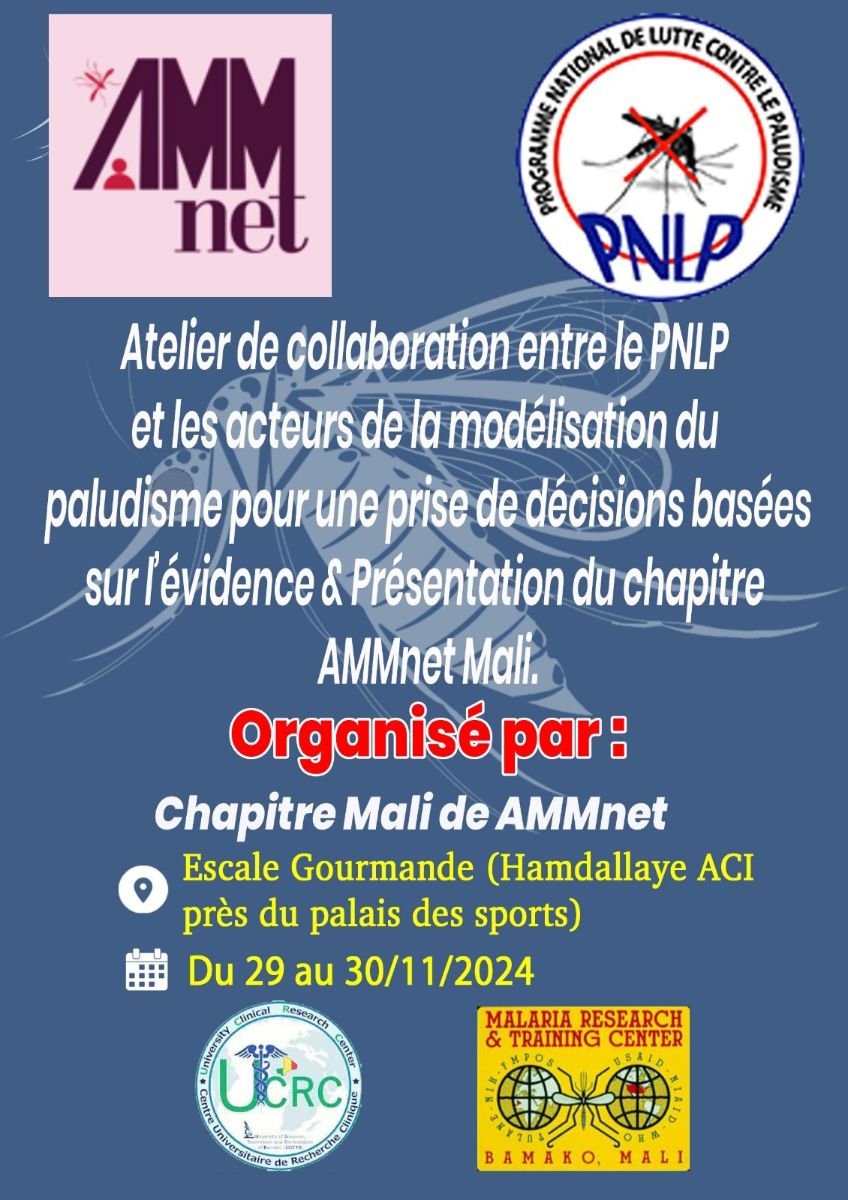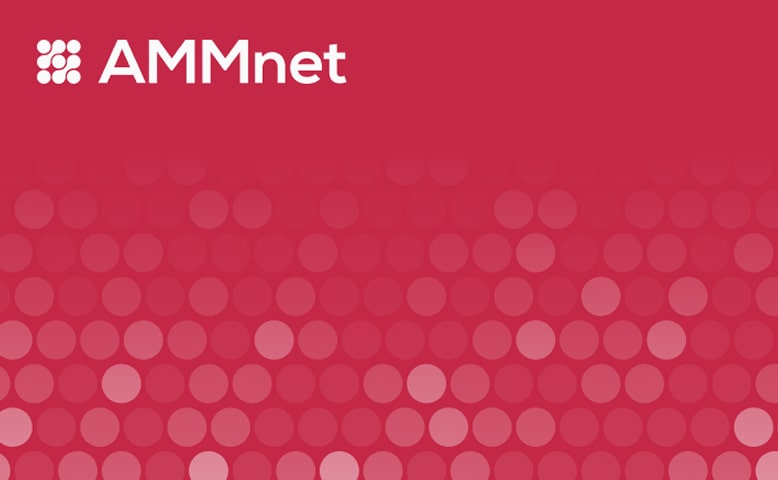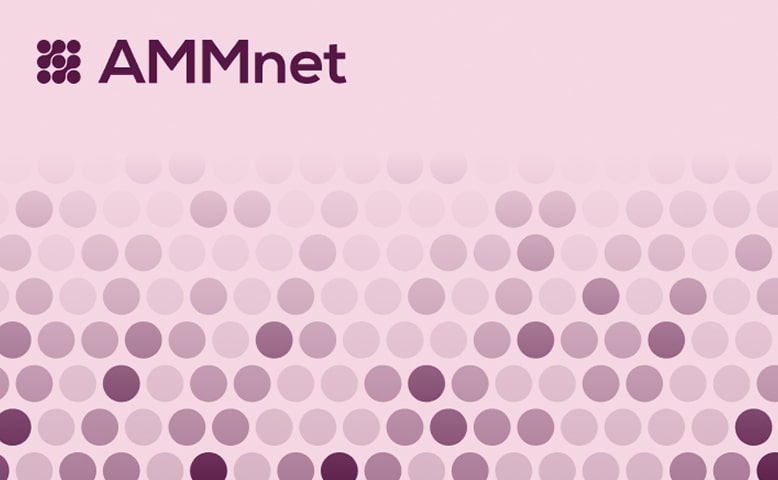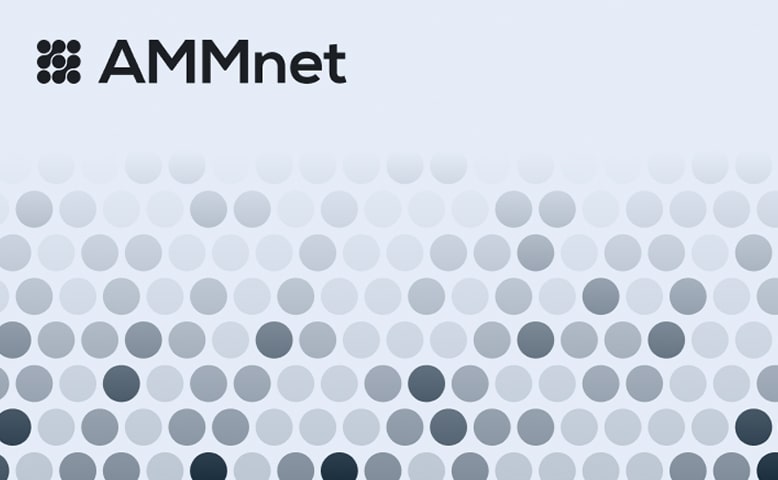Welcome to the November 2024 newsletter!
Please contact info@ammnet.org if you would like to contribute any items to next month’s newsletter.
Register for the AMMnet Monthly Seminar | December 3, 15 hr UTC
Training malaria modelers from sub-Saharan Africa: Experiences from the faculty enrichment (FE) program
Guest Speakers: Dr. Mor Absa LOUM and Dr. Isaiah Awintuen Agorinya
The Faculty Enrichment (FE) Program is an innovative initiative tailored to equip sub-Saharan African faculty with the skills needed for operational malaria modeling, enhancing local capacities for evidence-based malaria control. This 8-week in-person program emphasizes technical proficiency, scientific communication, and community building, targeting faculty who can sustain and disseminate the skills within their institutions. The program includes applied training where participants choose a track to address public health challenges through projects. It emphasizes skill development in modeling, data interpretation, and communication. Networking opportunities are provided through global platforms like AMMnet, fostering collaboration. Additionally, regular feedback and assessments through independent program evaluators are implemented to enhance the program continuously. This program addresses gaps in local expertise by targeting faculty who can influence future generations of modelers and work closely with malaria control programs. It combines advanced technical training with practical applications to support sustainable, localized malaria modeling effort.
Dr. Mor Absa LOUM
Dr. Mor Absa LOUM is a Lecturer and Researcher at the Iba Der Thiam University of Thies, Senegal, specializing in biostatistics and infectious disease modelling. Dr. LOUM previously I obtained a master and a PhD in applied mathematics and modelling at Paris-Saclay University before a 3-year postdoc in modelling the genetic variant effects on neurodevelopmental disorders at Montreal University (Sainte-Justine research center, Sébastien Jacquemont Lab). He has led impactful research and capacity-building initiatives, particularly in malaria modelling at Thies University through WAMCAD project and faculty enrichment program. He has collaborated on international projects, mentored upcoming public health professionals, and published widely in peer-reviewed journals. His work focuses on training modelers and supporting policy makers decisions through modelling interventions effectiveness.
Dr. Isaiah Awintuen Agorinya
Dr. Isaiah Awintuen Agorinya is a Senior Lecturer at the University of Health and Allied Sciences, Ghana, specializing in epidemiology, biostatistics, and infectious disease modeling. With a PhD in Epidemiology from the University of Basel, Switzerland, and over a decade of experience, he has led impactful research and capacity-building initiatives, particularly in malaria modeling and maternal and child health. Dr. Agorinya has collaborated on international projects, mentored upcoming public health professionals, and published widely in peer-reviewed journals. His work focuses on leveraging quantitative methods to inform policy and improve health outcomes in low- and middle-income countries.
Real-time interpretation to French and Portuguese will be available.
USA-based members: Please note that despite daylight change, the seminar will continue to take place at 15:00 UTC. Please take into account the one-hour time difference.
Register for December 3 seminar here
Upcoming January Seminar
Presentation by Small Event Awardees
- Date: January 7, 2025
- Presenters: 3 - 4 Small Grant Awardees
- Topic: Lessons Learned from Organizing and Hosting Regional Events
Register for January 7 seminar here
AMMnet Small Event Award Applications Due December 1!
To be considered for this funding cycle, submit your application to info@ammnet.org by December 1, 2024, 23:59 GMT.
UPDATE NOTE: We have replaced the proposal with the small grant award template here. This document will act as your proposal.
For more information, please visit the website here. Items to include in your application are listed below.
- Small Grant Award Template
- Biosketch (CV or resume) for key personnel
- A letter of support from the institution(s) of the main event organizer(s), signed by an institutional authority, confirming the organizer’s position in the institution and that the institution supports the application and the proposed activities.
More information and guidance here
AMMnet Large Event Awards
24 applications were received from members in Brazil, Nigeria, Cameroon, Bangladesh, Rwanda, Chad, Uganda, Benin, Ethiopia, DRC, Mozambique, Gambia, Guinea, Tanzania, Kenya, and Burkina Faso!
The review task force aims to select the top two event applications for funding. Look for an announcement with details about the awardee to come in January 2025.
Submit your application before the next Large Event Award submission deadline -- April 15, 2025
- Requirement Reminder: Applicants should submit a letter of support from each of the named personnel, confirming their participation and role on the proposed event
More information and guidance here
The next AMMnet Virtual Hackathon: Mapping in R
Details coming soon!
You can find recordings and materials for all previously held hackathons on our blog.
- Data Visualization in R
- Data Wrangling in R
Call for AMMnet Seminar Speakers and Meet-the-Modelers
Are you interested in speaking at the monthly seminar series? Seminar speakers have the following options:
- 30-minute presentation about your work as a guest speaker
- 10- minute talk during a shared session with other AMMnet members
- 2-minute lightning introduction at a start of a seminar as a Meet-the Modeler
Send us an email at info@ammnet.org and let us know which type of presentation you would like to do along with your topic and AMMnet secretariat and the Connecting Committee will work with you to identify a seminar date that works best for you.
Social Media Posting Request Form
Share your AMMnet event or other malaria modeling topics on AMMnet's social media channels
Complete the form here to submit your request and we'll post on our social media channels (Facebook, X, Linkedin).
Pour utiliser le formulaire de médias sociaux en français, veuillez cliquer ici.
Para utilizar o formulário português para as redes sociais, clique aqui.
Submit your Social Media Request Here
Join the AMMnet Slack Workspace
Join the AMMnet Slack Workspace and connect directly with members, get announcements, including job, funding, collaborative opportunities and information about upcoming events.
Join the AMMnet WhatsApp Group
Join the AMMnet WhatsApp Group and connect directly with members, get announcements, including job, funding, collaborative opportunities and information about upcoming events.
Join AMMnet WhatApp Group Here
Jobs and Grant Opportunities
Senior Scientific Assistant
The Biostatistics Unit at Swiss TPH is looking for a Senior Scientific Assistant
The position includes contributing to different projects that involve modelling of spatio-temporal, health and environmental data.
Find More Information and How to Apply Here
Prevention Effectiveness Fellowship
The PE Fellowship is recruiting approximately 10 modeling fellows in 2025.
CDC's Steven M. Teutsch Prevention Effectiveness (PE) Fellowship is a two-year post-doctoral research fellowship focusing on the application of mathematical modeling, forecasting, advanced analytics in public health, health economics, decision science, and disease modeling.
Applicants must hold a doctoral degree in a mathematical or analytical field such as mathematical modeling, operations research, ecology, quantitative epidemiology, or other applied science field.
Fellows are matched with CDC programs and focus on work related to disease transmission, individual, compartmental, and agent-based, spatial, network, simulation, system dynamics, or econometric models. Training will be provided in decision analysis, disease transmission modeling, advanced econometrics, machine learning and big data analysis, data visualization, and key software applications such as R, Julia, Python, etc.
All doctoral degree requirements must be completed by 7/18/2025. The starting annual salary is approximately $98,000 plus Federal benefits. The fellowship begins on 8/11/2025 with an intensive orientation and training program.
The application period is open September 3, 2024 through January 3, 2025.
More Information and How to Apply Here
CHAI is recruiting 3 Epidemiologists to work in Africa.
The Clinton Health Access Initiative, Inc. (CHAI) is a global health organization committed to a mission of saving lives and reducing the burden of disease in low-and middle-income countries.
CHAI is seeking highly motivated epidemiologists with strong public health experience to oversee and guide the activities and operations of the epidemiology team based in Africa.
Find more info and apply: Epidemiologist, Sr Technical Advisor
Find more info and apply: Epidemiologist, Technical Advisor
Find more info and apply: Epidemiologist, Research Associate
2025 CHAI Internship
The Clinton Health Access Initiative, Inc. (CHAI) is excited to offer students the opportunity to contribute to their mission through select internship opportunities. As an intern, you’ll have an immersive experience, allowing you to work on impactful global health projects across multiple programs and countries while building the skills and expertise necessary for a career in global health. As an Intern, you will work alongside CHAI professionals, contributing to real-time projects that drive CHAI’s mission forward.
Find more information and Apply Here
Subgroups, Working Groups, and Regional Activities

Join the AMMnet Local Chapter Discussion Group
Next meeting December 17, 2024, 12:30 GMT
The Best Practices for Starting a Local Chapter Task Force has launched a discussion group for those in the process of starting a local chapter.
This is a forum where local chapter leads can share experiences, knowledge and ideas.
Join the discussion by sending an email to info@ammnet.org and request an invitation. The group meets every other month.
Guidelines for Establishing an AMMnet Local Chapter
AMMnet’s Local Chapters bring together modelers, analysts, scientists, public health professionals, partner institutions and civil society, to work together locally to adopt common approaches to improve the use of modeling and analytics for controlling and eliminating malaria whilst reflecting the mission of Global AMMnet.
Establishing a local AMMnet chapter is a three-step process:
- Pre-registration with global AMMnet
- A completed Local Chapter Establishment Application Form
- AMMnet Board approval with guidance from the Local Chapter Review Task Force
If you are an AMMnet member and you are interested in establishing a local chapter, please refer the information and guidelines found at the link below.
If you have any questions, considerations or suggestions for establishing local AMMnet chapters, please send us an email at info@ammnet.org.
Local Chapter Information & Guidance
Seminar Recap and Recordings
AMMnet Seminar Series:
2024 November 5
Maps & Malaria Elimination: To Model or Not? Lessons from Malaria Elimination Countries
Speaker: Dr. Frank Kagoro
Dr. Kagoro shared his experience in mapping Artemisinin resistance in Southeast Asia and South Africa. He presented his lessons and good practices of how to make maps more impactful. The best practice is that maps pass through a cartographic framework which helps assess the map’s usability. This framework ensures (a) clarity of the content of the map – trying to answer questions such as: Am I trying to present too much information? Are there data I should present before this one? (b) clarity on what the audience would learn from the map and (c) what action the map would trigger. Dr. Kagaro presented examples of how these components can be carried out using different qualitative assessment methods, which feed back into the process in an iterative manner. Dr. Kagaro has also initiated an Ubuntu platform that among other things hosts multiple networks across Africa including on enhancing routine data for real time surveillance and on health mapping.
You may find a recording of the seminar on our website or YouTube along with recordings from other past special events and seminars.
Recordings in French, English and Portuguese are available.




